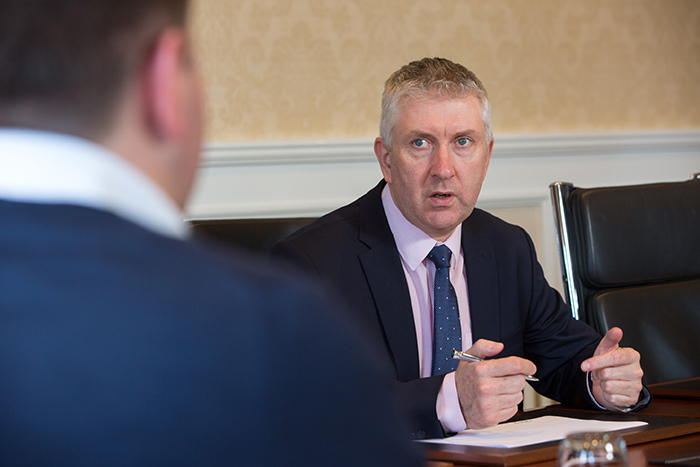NI pharmacy “light years behindâ€, facing “indiscriminate†closures
In News
Follow this topic
Bookmark
Record learning outcomes

The community pharmacy sector in Northern Ireland continues to labour under a funding crisis that keeps the development of pharmacy services “light years” behind other parts of the UK and will ultimately lead to “indiscriminate closures”, Community Pharmacy Northern Ireland has said.
On October 31 CPNI chief executive Gerard Greene told an All-Party Parliamentary Group (APPG) on Pharmacy hearing on pharmacy in the devolved nations that the ongoing failure to agree new contractual arrangements and a funding shortfall of £20m per annum, combined with the fallout from generics shortages, meant patients in Northern Ireland were being deprived of services that have been available in other parts of the UK for some time.
CPNI has been involved in funding disputes with the Department of Health (DHNI) since 2011 (see Background below). The organisation says DHNI’s failure to offer contractors “fair and reasonable remuneration” has prevented a contract being agreed upon and will ultimately lead to widespread closures.
Mr Greene commented on the stark contrast with Scotland and Wales, which provide “excellent examples of what innovation and development looks like”. Pharmacists in those countries “have been prioritised for training in independent prescribing,” whereas this “is not even being considered in Northern Ireland”.
He argued that the Northern Irish healthcare system “needs radical change” and that supporting pharmacists to be more instrumental in public health and the prevention and management of long-term conditions would be “key”.
Calling on the APPG to intervene, Mr Greene said: "“How can we meet the changing needs of public healthcare when there is huge funding problems in the background? We are falling further behind and need the members of the APPG on Pharmacy to recognise that and intervene on our behalf – especially when we have no Assembly or Executive to deal with this devolved issue.”
Generics shortages
The “unprecedented generics shortages” pharmacies were experiencing made the situation particularly acute, Mr Greene commented: “Development in community pharmacy has suffered significantly as the current £20m per annum funding shortfall has been compounded in recent months by unprecedented generic medicines shortages leaving community pharmacists and their staff with a daily struggle to find many of the medicines needed by their patients.”
When pharmacists manage to source the items required, “they can find themselves paying more than 10 times the usual price,” he added, “all without knowing if they will be fully reimbursed”.
“Light years behind”
Mr Greene said: “We are light years behind in terms of patient services and the fact that the community pharmacy network in Northern Ireland has been plunged into financial uncertainty since 2011-12 has had a detrimental impact for everyone.
“The £20m per annum funding gap and the Department of Health’s reticence to deal with it means that we are regressing.”
David Galloway, Northern Ireland director of the MS Society said: “Patients rely on pharmacists to not only dispense drugs but also to advise them on how to take medicine appropriately and answer any questions they have around managing their medication. We urgently need the Department to recognise that the growing pressures on community pharmacy pose a significant risk to patient safety.”
Background: "Years of underfunding"
While there are currently 532 community pharmacies in Northern Ireland, CPNI says that the community pharmacy network “is now at a critical crossroads, with many pharmacies facing closure as a direct result of underfunding by the DHNI.”
The funding dispute dates back to 2011, when the Drug Tariff payment mechanism was introduced. A series of financial investigations were carried out to determine the level of funding needed to provide fair remuneration to the sector, with the co-operation of CPNI and other bodies.
PricewaterhouseCoopers carried out a Cost of Service Investigation (CoSI) for DHNI, publishing its report in 2017. CPNI says that while the CoSI report “supported the original position expressed by CPNI,” DHNI now disputes the findings of this report.
CPNI says that in 2017-18 “against a background of years of underfunding” a further £20m in funding was removed from the funding package, adding that at this time “DHNI also sanctioned a similar level of investment in Trust and GP practice pharmacists”.
CPNI says DHNI’s failure to pay contractors “fair and reasonable remuneration” has already led to pharmacies taking measures like reducing services, cutting back opening hours and seeking to negotiate extended credit terms with banks and wholesalers.
“Without a resolution, the start of pharmacy closures is imminent. Once this begins closures will be indiscriminate in nature, affecting both urban and rural communities,” CPNI says.
The representative body says it has “extreme health and safety concerns for both patients and the pharmacy contractors themselves”.
